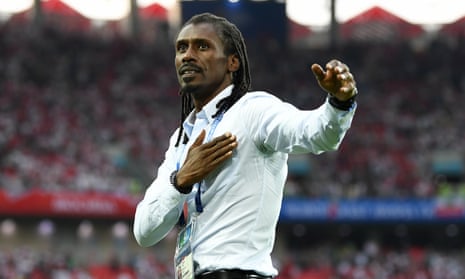Senegal had to wait and it was a painful one. Drawn to play in the final tie of the first round of group fixtures, they watched as, one by one, their fellow African competitors slumped to defeat. First it was Egypt and Morocco; then Nigeria and Tunisia – all beaten and with only one goal to show between them. Even that was a penalty, scored by Tunisia’s Ferjani Sassi against England.
Before Senegal’s bow against Poland at the Spartak Stadium on Tuesday, the manager, Aliou Cissé, said that Africa’s toils were not on his mind; they did not add up to additional pressure or motivation. It was a white lie. Senegal had felt it, all right. They knew they were playing for African pride.
The truth came out after the 2-1 win over Poland, a success built on steely mentality as much as anything else. “We saw the other African teams lose their first games and it gave us power to play for Africa,” the striker Diafra Sakho, who was an unused substitute, said. “Now, all of Africa is happy.”
Even Cissé did not downplay the significance of a win for Africa. “Absolutely, it was important,” he said. “Senegal represent the whole African continent. We are Senegal but I can guarantee that the whole of Africa is supporting Senegal. I get calls and lots of people are proud. We are proud to represent the African continent.”
The notion of such a support network across say, Europe, is hard to imagine. But sporting togetherness in Africa is a powerful force. “It’s true and it’s important,” Sakho, the Rennes player, formerly of West Ham, said. “We need to be together if the African continent is going to win a World Cup. It’s a very important job for us to keep it this way, to play together. That way, we’re going to make a lot of victories.”
Pelé’s prediction, made in the late 1970s, that an African nation would win the World Cup by 2000 has not aged well. Cissé was a midfielder in the Senegal team who reached the quarter-finals in 2002 but no African country has made it further. Cameroon (1990) and Ghana (2010) are Africa’s other nations who reached the last eight.
“It’s time now to give us all in Africa one opportunity to win a World Cup,” Sakho said, bullishly, and Senegal are surely the continent’s best hope of progress this time, even if them winning it remains an outlandish prospect.
The victory over Poland was sparked by a lucky break, when Idrissa Gana Gueye’s shot, which was going wide, ricocheted in off the Poland defender Thiago Cionek.
There was a measure of controversy to their second. M’Baye Niang had been off the field for treatment and, when he returned, he raced straight on to Grzegorz Krychowiak’s woeful backpass to touch past the advancing goalkeeper, Wojciech Szczesny, and score. Cissé had been readying the substitute Cheikh Ndoye at the same time and Poland did not expect to see Niang.
“It was bizarre,” Szczesny said. “The player who played the ball [Krychowiak] didn’t see their player had come back on to the pitch and he played it short. I was the only one who saw the danger so I had to react and come out or otherwise the player was through on goal but he got in front of me.”
Sahko made the most persuasive point. “The referee gave Niang permission to come into the game and, if the referee gives his permission, it counts, this goal.”
Senegal mustered only two shots on target, with the own goal not counting, and they did catch the breaks. But, equally, it was a tactical triumph for Cissé because his team never looked in trouble and they possessed speed and threat on the counterattack. Ismaïla Sarr on the right of the midfield three and Youssouf Sabaly at left-back have pace to burn. Senegal pressed high and they cut off the service to the Poland dangerman, Robert Lewandowski.
“We managed to control the game tactically and emotionally,” Cissé said. “We won thanks to discipline. We had a very compact team, also very aggressive. We know that Poland can play two systems [4-4-2 and 3-4-3], which they did, and we knew exactly how they were going to move. We also knew that Lewandowski was the main element. We knew how to implement the right system.”
Earlier on Tuesday, Japan had surprisingly beaten Colombia and there is the sense that Group H has been turned on its head. “Maybe for you it’s unexpected but we are happy,” Kalidou Koulibaly, the Senegal and Napoli centre-half, said. “It’s a difficult job but we know we can do it.”
Senegal’s confidence has been pepped but, before Sunday’s tie against Japan in Ekaterinburg, the watchword remains humility. “We are not too euphoric because we know it will be a difficult match against Japan,” Cissé said. “We need to question everything and prepare for the Japan match in the same way.”
